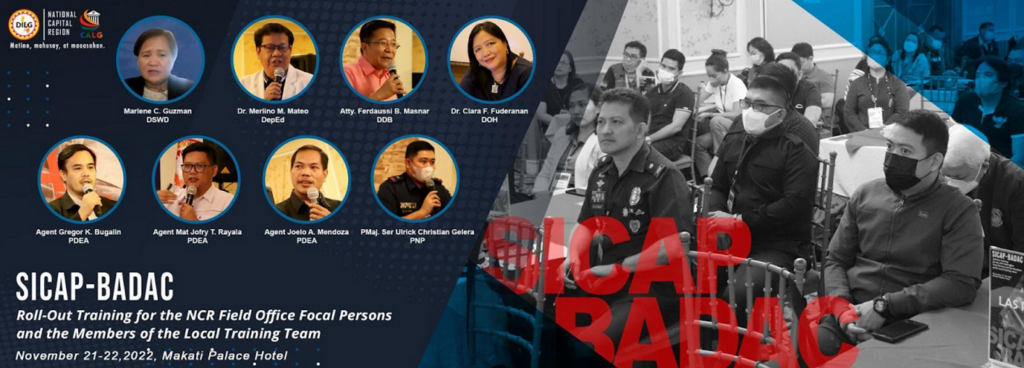
As part of the continuing nationwide campaign against illegal drugs, the Department of the Interior and Local Government – National Capital Region (DILG-NCR) conducted the “Strengthening Institutional Capacities of Barangay Anti-Drug Abuse Council (SICAP-BADAC): Regional Training of Trainers (TOT) for DILG Field Focal Persons and Local Training Teams.”
The training activity ran from November 21-22, 2022 at the Makati Palace Hotel.
A capacity development intervention program for the BADACs, the SICAP-BADAC underscores the crucial role of the barangays in the fight against illegal drugs.
Regional Director Maria Lourdes L. Agustin, CESO III, remarked: “Our Barangay Anti-Drug Abuse Councils, BADACs for short, are the backbone of our campaign against drug abuse at the grassroots… hence, there is a need to empower, equip and enhance their knowledge, skills, and attitude for them to effectively and efficiently perform their duties.”
“In a larger sense, the BADACs all across the country can be a network that makes possible not only the sharing of intelligence but, more importantly, the partaking of knowledge, expertise, and best practices of our efforts to defeat the drug problem in our communities,” RD Agustin further emphasized.
116 participants from 17 Local Training Teams across the region attended the two-day TOT activity and partook in the spirited discussions led by various resource persons from national government agencies.
Joined by partner NGAs from the Dangerous Drugs Board (DDB), Philippine Drug Enforcement Agency (PDEA), Department of Health (DOH), Philippine National Police (PNP), Department of Social Welfare and Development (DSWD), and Department of Education (DepEd), the Regional TOT covered subjects on: Drug Prevention and Control, Strengthening of Preventive Drug Education, the Implementation of Drug-Free Workplaces, and the Implementation of the Barangay Drug Clearing Program (BDCP), among others.
During the discussions, relevant data and statistics were presented to the NCR Local Training Teams on how the COVID-19 pandemic negatively impacted the anti-drug initiatives of the government.
Dr. Clara Fuderanan from DOH and Agent Gregor Bugalin from PDEA elaborated on some of the positive and negative impacts of the pandemic on the drug abuse and anti-drug campaigns conducted across the country. “Due to the pandemic, there was a decrease in anti-drug operations and the number of drug-cleared barangays.” Agent Bugalin disclosed.
To mitigate the negative impacts of the pandemic, Dr. Fuderanan from DOH, PMaj. Ser Ulrick Christian Gelara from PNP, Dr. Merlino Mateo from DepEd and Ms. Marlene Guzman from DSWD presented the countermeasures adopted by their respective agencies, which largely focused on education and reintegration, i.e., providing assistance to drug users towards their rehabilitation and reintegration into society.
Atty. Ferdaussi Masnar from DDB also contributed to the discussions by elaborating on the importance of implementing drug-free workplace policies on a wider scale.
On further strengthening the anti-drug efforts and initiatives amid the pandemic, Agents Bugalin, Mat Jofry Rayala and Joelo Menoza from PDEA discussed in detail the implementation of BDCP which is considered to be one of the most effective measures in curbing illegal drug use in the country, as the BDCP encompasses a holistic and whole-of-nation approach in addressing the drug problem.
“This program enlists the participation of you, our LGUs; us, the NGAs; and various stakeholders of the national anti-drug campaign. Essentially, BDCP envisions all of us working together to achieve our goal of drug resilient and self-policing communities,” the PDEA officials added.
In her closing remarks, Assistant Regional Director Atty. Ana Lyn R. Baltazar-Cortez, CESO V enjoined the Local Training Teams to embrace a holistic and participatory approach in implementing the anti-drug policies and programs in their communities: “We are now seeing more local, community-based, and holistic solutions to the drug problem, which is a change from previous emphasis on police enforcement action.”
“This shift in mindset must be incorporated in your mentoring to ensure that you all are in sync with current policy and consistent with best practices when addressing drug abuse.” ARD Baltazar-Cortez noted.
